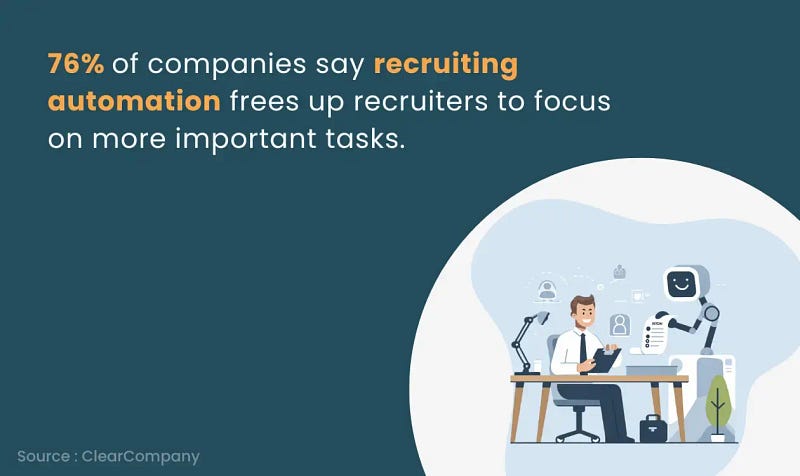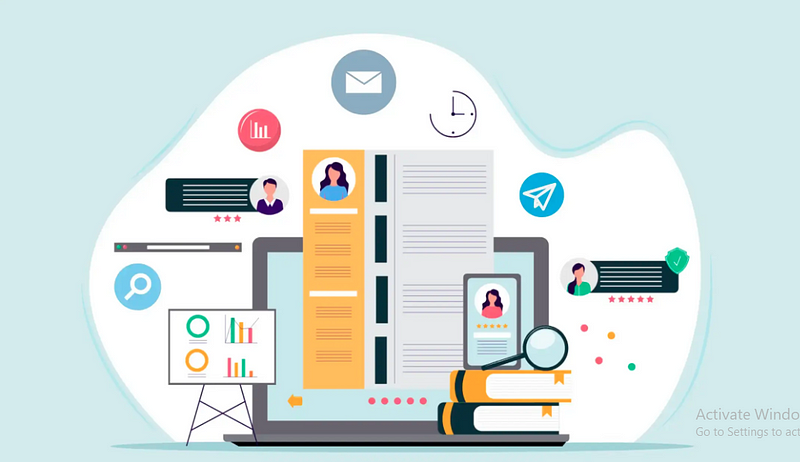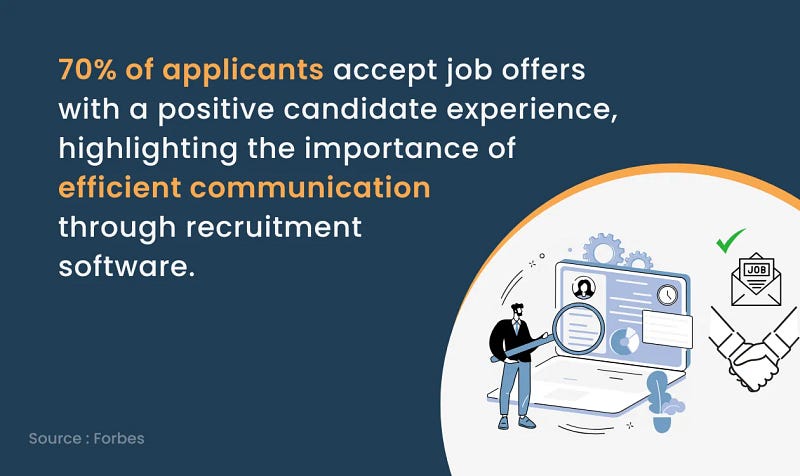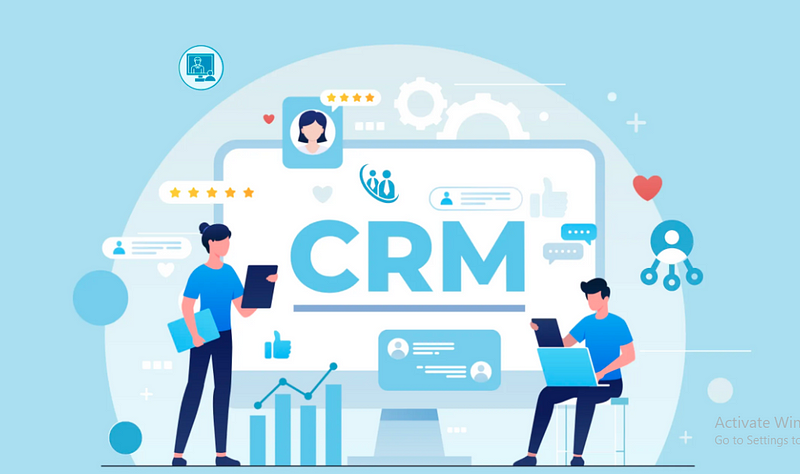
In today’s fast-paced and highly competitive job market, finding the right talent can be a tough nut to crack, right?
Before and after hiring, doing that manual task was also difficult, but it is not anymore.
It’s like a digital Sherlock Holmes that can help you find the perfect candidate for your team in a snap of fingers.
That’s the “Best Recruitment Platforms”.
This invisible superhero is designed to streamline your hiring process, making it as smooth as a well-oiled machine.
Having talent acquisition software isn’t just a luxury — it’s a necessity whether you are a small or large corporate business.
But so many options are available in the market, it can be a bit of a head-scratcher, right?
You have so many confusing questions, such as, What features should you look for? And how can you be sure it’s the right fit for your unique needs?
Well, hold onto your hat.
You land on the right page. This guide of the 12 Best Recruiting Software list will help you to skyrocket your hiring in 2025.
You’ll learn about their features, pricing, and what makes each one unique.
By the end, you’ll be able to make an informed decision that’ll leave you speechless!
So, are you ready to find the Best recruiting software list for your business? Let’s get this show on the road!
12 Best Recruiting Software List for Successful 2025
Let’s discover the 12 best recruiting software list to achieve recruiting success in 2025. These best AI-related tools for recruiters will help them conduct effective recruitment smoothly and enhance the candidate experience.
What are you waiting for? Let’s dive in!
1. iSmartRecruit — Highest Rated & Best Recruiting Software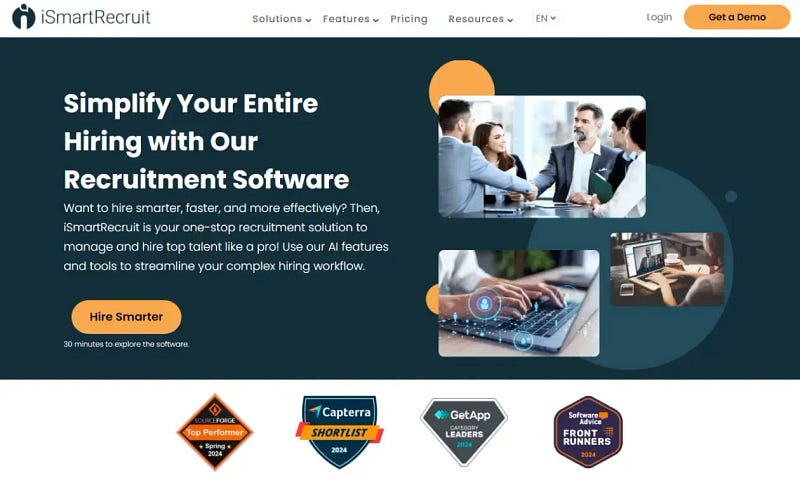
Are you looking for the best AI-related tools for recruiters and HRs to automate, manage and streamline end-to-end recruitment? Then, take the test drive of iSmartRecruit now!
iSmartRecruit is a user-friendly AI recruitment software designed to streamline and manage the end-to-end hiring process. It offers highly scalable features for sourcing candidates, managing workflows, scheduling interviews, collaborating with your team, and making recruitment efficient and effective.
This best recruiting software eases the steps of recruitment for recruiters, HRs, hiring managers, headhunters, staffing agencies, and startups. More importantly, it is affordable and customisable, and it has every feature our recruiting team needs.
Key Features:
- AI-Powered Profile & Job Matching: Automatically identifies the best candidates for your job openings while also suggesting the most relevant roles to candidates based on their profiles and preferences.
- Advanced Database Search: Quickly find and match candidates to job requirements with precision using robust search features like Boolean, fuzzy, semantic, and proximity search.
- Auto-Pilot Workflow: Automate routine tasks like note-taking, task assignments, and email communications, allowing your team to focus on higher-priority activities.
- Analytics & Reporting: Easily track key recruitment metrics with advanced analytics and reporting tools, all while staying GDPR compliant.
- Recruitment Marketing: Build lasting relationships with top talent through targeted campaigns and strategic outreach, helping you strengthen your employer brand across multiple platforms.
- Effective Client/Candidate Relationship Management: From leads to candidate hire, our CRM will help you build positive relationships with clients and candidates.
- Highly Customisable: With iSmartRecruit’s highly customizable features, you can adapt workflows, interfaces, and settings to perfectly align with your specific needs and preferences.
Pricing:
iSmartRecruit provides a flexible pricing model to suit every business, whether it is a small business or a well-established organisation. Contact our sales team at sales@ismartrecruit.com for a customised pricing model.
Capterra Review: 4.6
2. Ceipal — Good for Candidate Sourcing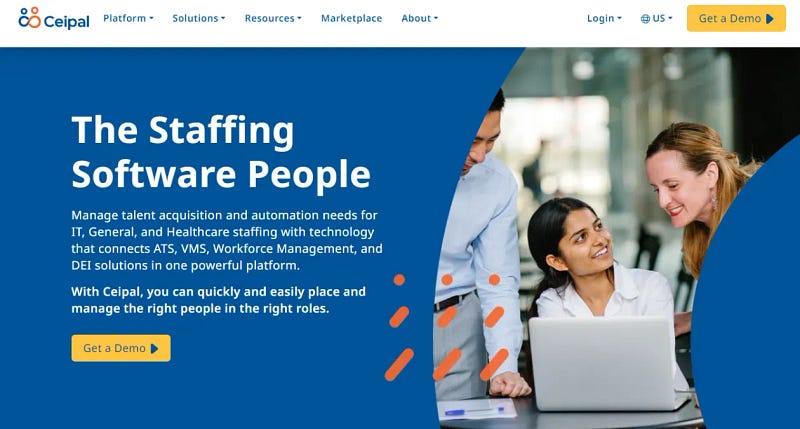
Ceipal is an innovative workforce management and recruiting software designed for the modern workplace. It integrates seamlessly into your HR processes, offering a comprehensive suite of tools for talent acquisition, analytics, and workforce management.
Key Features:
- No more hiring silos
- Best-in-class usability
- Automation powered by AI
Pricing:
- ATS — $24/user/month with (5 users minimum)
- Advanced Automation Bundle — $48/user/month (5 users minimum)
- Workforce Management — $4/user/month (25 users minimum)
Capterra Review: 4.6
3. Elevatus — Designed for Overall Recruitment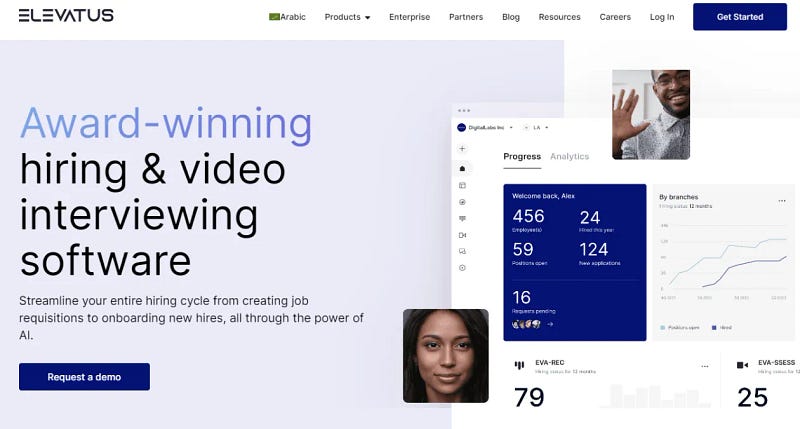
Elevatus is an award-winning recruitment software that automates the entire talent acquisition cycle — from creating job requisitions to onboarding new hires.
This AI tool for recruitment helps hundreds of companies from all over the world take their recruitment to the next level through futuristic AI technology and unrivalled recruiting solutions. Allowing them to streamline core functions such as posting jobs, shortlisting top talent, interviewing candidates, evaluating top performers, managing visas, accessing advanced analytics, running background checks, inviting recruitment agencies, and onboarding new hires.
Key Features:
- Centralized resume database
- 2000+ integrations with job boards
- AI-powered candidate matching
- Onboard a group of new hires at once
- AI-powered video assessments
Pricing:
Elevatus provides a flexible pricing model to suit every business; contact their sales team for pricing quotes.
Capterra Review: 4.8
4. Manatal — Designed for In-house Hiring Teams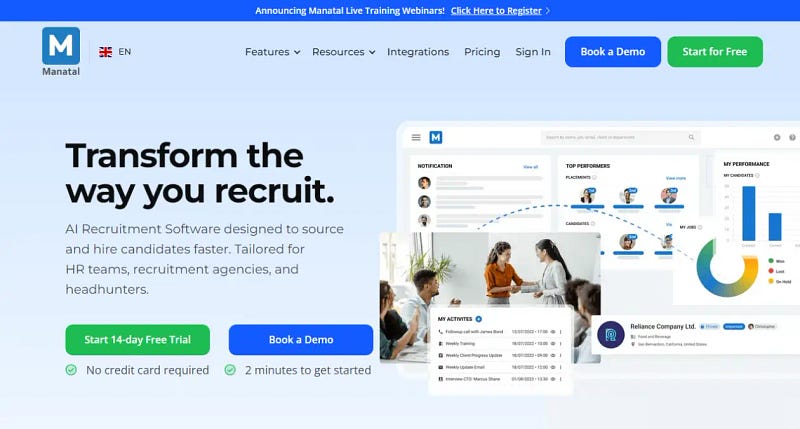
Manatal is an innovative recruiting software designed for hiring teams to streamline their recruitment process, from sourcing candidates to managing applications. It helps you find and manage the best talent easily
Key Features:
- AI-Powered recommendations
- Candidates profiles enrichment
- Candidate onboarding & placement management
Pricing:
- Professional Plan — $15/per user per month
- Enterprise Plan — $35/per user per month
- Custom Plan — For custom integrations on demand
Capterra Review: 4.7
5. Recooty
Recooty is an AI-powered recruitment software designed to simplify hiring for businesses of any size. It automates tasks like job posting, resume parsing, and candidate ranking with easy-to-use tools.
Key Features:
- AI-Powered Automation
- One-Click Job Posting
- Bias-Free AI Job Description Generator
- AI Salary Estimator
- Collaborative Hiring
- Recruitment Analytics
Pricing: Recooty offers flexible pricing plans tailored to suit businesses of different sizes. All plans include a 15-day free trial, allowing recruiters to explore Recooty’s features before committing to a paid plan.
- Starter Plan: $79/month
- Standard Plan: $149/month
- Premier Plan: Customized pricing available upon request
Capterra Review: 4.9
6. JazzHR — User-friendly & Affordable Solution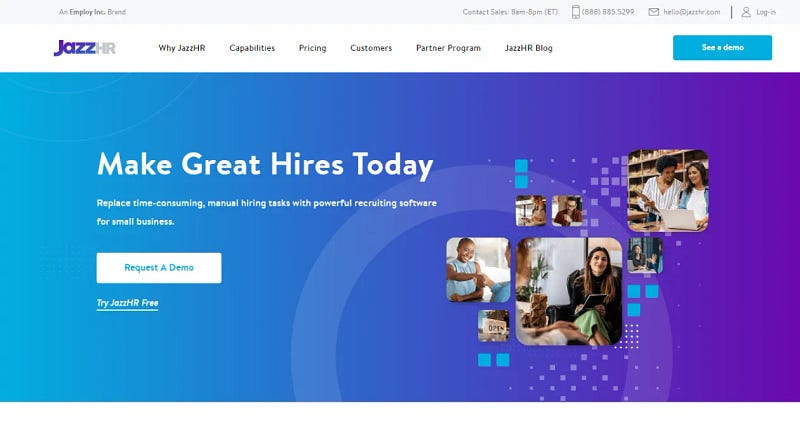
JazzHR is perfect if your recruiting needs might change in the future. You get unlimited jobs and users right from the start, with no extra charges, as your needs grow. Plus, you can sign up and use it right away.
Key Features:
- Unlimited jobs & users
- Fast implementation
- Highly configurable
Pricing:
- Hero — $49 /mo when billed annually
- Plus — $239 /mo on an annual plan
- Pro — $ 359 /mo on an annual plan
Capterra Review: 4.3
7. Jobvite — For Small & Growing Businesses
Jobvite offers streamlined hiring that can adapt to your talent acquisition requirements. It ensures consistent hiring results, provides exceptional candidate experiences, and boosts your recruiting capacity efficiently, all within a single talent acquisition suite.
Key Features:
- Robust talent pipeline
- Predictive analytics
- Customisable workflows
Pricing:
Contact their sales for custom pricing details
Capterra Review: 4.1
8. Teamtailor — For Small & Midsize Business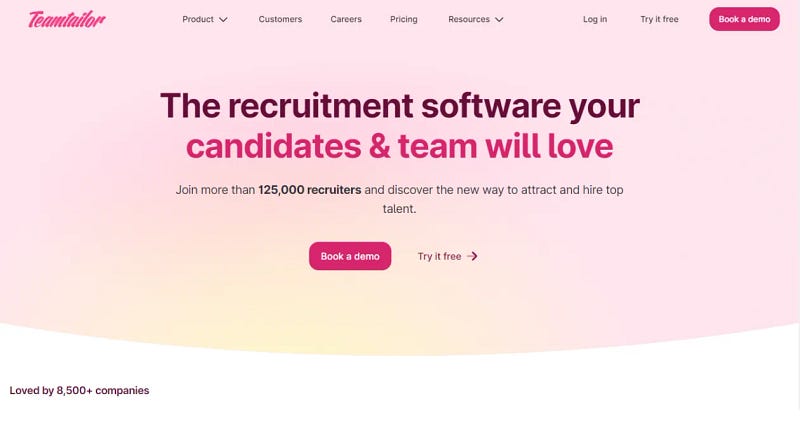
Teamtailor redefines the way you find and attract talent. It has introduced user-friendliness and features that have transformed our work methods, fostering increased collaboration among the hiring team. This one is the hidden gem for small businesses among these best recruiting software.
Key Features:
- End-to-end recruitment management
- Quick and easy onboarding
- Live chat support for all users
Pricing:
Go to their pricing page, fill out this form, and get an estimated price.
Capterra Review: 4.7
9. SmartRecruiters — Good for Mass Recruitment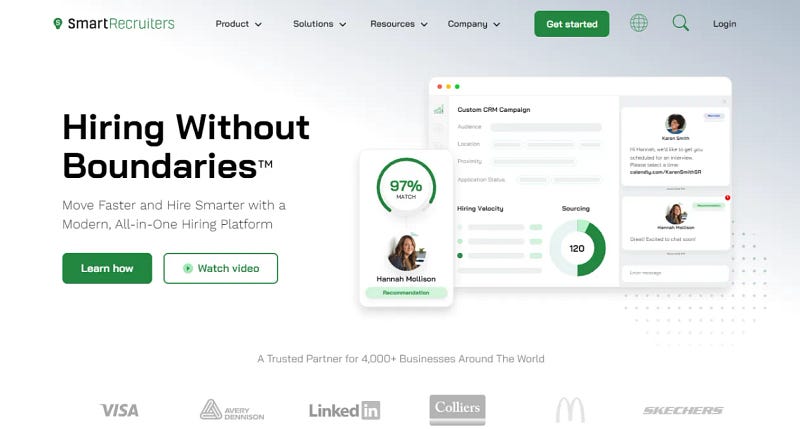
SmartRecruiters provides a strong ATS integrated with recruitment marketing features that boost recruiter efficiency, encourage team collaboration within the hiring team, and elevate the candidate journey
Key Features:
- Streamline applicant tracking
- Fatsre screening
- Modernise offer management
Pricing:
Contact their sales for custom pricing details
Capterra Review: 4.2
10. Kula ATS — The All-in-One Solution for Modern Recruiting Teams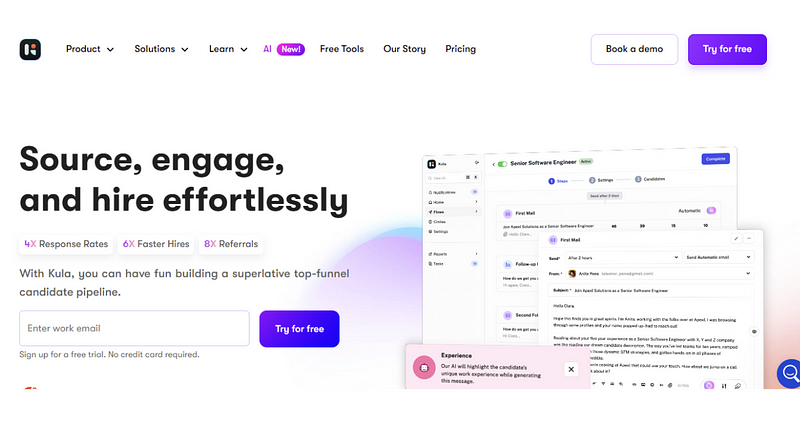
Kula ATS is a powerful recruitment platform that automates every hiring process step, from job posting to onboarding. This AI-driven solution empowers recruitment teams to streamline workflows and focus on hiring top talent efficiently.
Kula ATS offers comprehensive features, including visual workflow builders, AI-enabled interview intelligence, and automated candidate scoring, allowing businesses to take their recruitment to the next level.
Key Features:
- AI-powered candidate scoring
- Visual workflow builder
- AI-enabled interview intelligence
- Career site builder
- Recruitment CRM
Kula offers custom pricing based on your business needs. Please contact their sales team for more information.
Free Trial:
Yes
11. Recruit CRM — Suitable for Staffing Agencies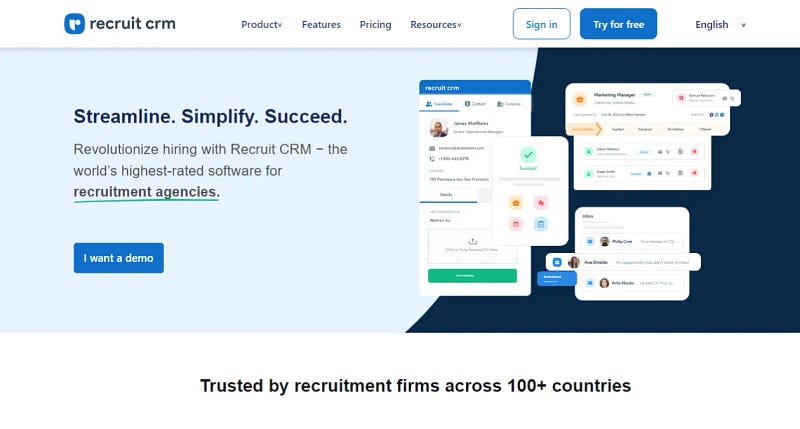
Recruit CRM streamlines and automates your complete recruitment process, from sourcing top-notch candidates to screening and making hires. Recruiters can efficiently manage clients, candidates, and job openings all in one place.
Key Features:
- Chrome sourcing extension
- Super fast 5-minute setup
- 24*7 live support
Pricing:
- Pro — $115 per user/month
- Business — $165 per user/month
- Enterprise — $225 per user/month
Capterra Review: 4.9
12. ClearCompany — Best for Onboarding Candidates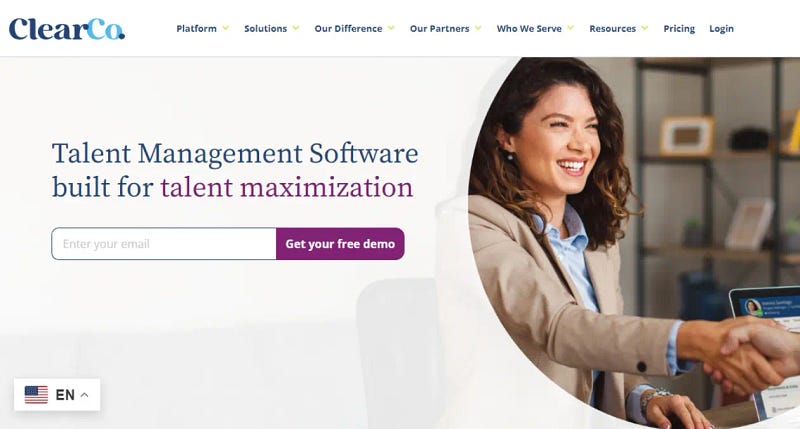
ClearCompany helps search firms efficiently sift through a vast pool of applicants, ensuring successful recruitment, engagement, and retention. It provides a comprehensive set of tools for every step of the talent lifecycle aimed at improving both the candidate and client experience.
Key Features:
- Complete talent management
- Effortless interview scheduling
- Centralised candidate management
Pricing:
Go to their pricing page, fill out this form, and get an estimated price.
Capterra Review: 4.4
14 Best Recruiting Software Features
This best recruiting software offers a wide range of features to streamline and improve the hiring process. Here are some top recruiting software features to consider when evaluating options:
1. Applicant Tracking System (ATS)
Efficiently manage and track candidate applications and profiles throughout the recruitment process.
2. Candidate Relationship Management (CRM)
Build and maintain candidate pipelines, nurture relationships, and engage with potential hires over time.
3. Job Posting and Distribution
Easily create and post job listings to multiple job boards and social media platforms to reach a wider audience.
4. Candidate Sourcing
Access extensive databases and search tools to find and attract potential candidates, including passive job seekers.
5. Resume Parsing
Automatically extract and categorise information from resumes and applications, making it easier to review candidate qualifications.
6. Interview Scheduling and Automation
Streamline interview coordination by allowing candidates to schedule interviews, sending automated reminders, and syncing with calendars.
7. Team Collaboration Tools
Foster communication and collaboration among hiring team members, allowing them to share feedback and evaluations on candidates.
8. Assessment and Skills Testing
Administer pre-employment assessments and tests to evaluate candidates’ skills and qualifications.
9. Onboarding Integration
Seamlessly integrate with onboarding software to facilitate a smooth transition from recruitment to employee onboarding.
10. Analytics and Reporting
Generate reports and analytics to track key recruiting metrics, such as time-to-fill, cost-per-hire, and source effectiveness.
11. Customisable Workflows
Design and adapt recruitment workflows to match your organisation’s unique hiring processes.
12. Compliance and EEOC Reporting
Ensure compliance with labour laws and regulations, including Equal Employment Opportunity Commission (EEOC) reporting.
13. Mobile Accessibility
Access the software on mobile devices, enabling recruiters to stay connected and manage tasks while on the go.
14. AI and Automation
Leverage artificial intelligence and automation for tasks like resume screening, chatbots for candidate interactions, and predictive analytics.
Fruitful Benefits of Best Recruiting Software in 2025
Indeed, recruitment software has become a valuable friend for recruiters and HRs. Here are the benefits of recruitment software.
1. Boost Efficiency
Recruitment software automates many manual tasks, such as sorting through resumes and scheduling interviews, saving recruiters precious time.
2. Improved Candidate Matching:
These tools use algorithms to match candidates with job openings based on skills, experience, and qualifications, increasing the likelihood of finding the perfect fit.
3. Centralised Data Management:
All candidate information is stored in one place, making it easy to access and review, which reduces the chances of missing out on potential hires.
4. Faster Communication
Communication with candidates is streamlined through email templates and messaging features, ensuring quicker response times and keeping candidates engaged.
5. Enhanced Team Collaboration
Recruitment software often includes collaborative features, allowing team members to work together seamlessly and share feedback on candidates.
6. Analytics and Reporting
Recruiters can track and analyse their hiring processes, helping them identify areas for improvement and make data-driven decisions.
7. Compliance and Security
These systems often include compliance features to help recruiters adhere to legal regulations and ensure data security.
8. Cost Savings
By reducing manual tasks and improving the efficiency of the hiring process, recruitment software can lead to cost savings in the long run.
How To Choose the Best Recruiting Software?
Choosing the best recruiting software for your needs requires careful consideration of several key factors.
By carefully considering the factors below and conducting thorough research, you can choose the best recruiting software that aligns with your organisation’s recruitment goals and helps you streamline and optimise your hiring process.
Here’s a step-by-step guide to help you make the right decision:
1. Identify Your Needs
Start by defining your specific recruiting needs. What are the pain points in your current process? What features and functionalities are essential for your organisation?
2. Budget Allocation
Determine your budget for the best recruiting software. Different solutions come with varying price points, so knowing your recruitment budget will help narrow down your options.
Additionally, considering OTE compensation models can align your budget with the expected return on investment from your recruitment efforts.
3. Review Scalability & User-Friendliness
Consider your organisation’s growth. Choose the best recruiting software that can scale with your needs so you won’t outgrow it quickly.
Also, look for software that is intuitive and user-friendly. Your team should be able to adopt it easily without extensive training.
4. Check Integration Capabilities
Ensure that the software can integrate with your existing HR and other systems, such as onboarding software or payroll system.
5. Compliance & Security
Ensure the software complies with legal regulations and provides data security measures to protect sensitive candidate information.
6. Customer Support & Training
Evaluate the level of customer support and training offered by the software provider. Quick and helpful support can be crucial.
7. User Reviews & Recommendations
Read user reviews and seek recommendations from colleagues or industry peers who have experience with the software you’re considering.
8. Demo & Trial
Before committing, request a demo or trial period to get hands-on experience with the software and ensure it meets your requirements.
Why is iSmartRecruit the Best Recruiting Software?
In today’s competitive recruitment landscape, iSmartRecruit is not just a choice; it’s your crucial hiring partner in success. It is more than just software; it’s a game-changer in the realm of talent acquisition.
It offers a complete recruitment solution to handle everything from candidate sourcing to the final hiring stages. This means you have a consistent, streamlined process, ensuring no candidate falls through the cracks.
Our software is not just another tool in the market; it’s a globally recognised solution trusted by agencies in over 70+ countries.
Our platform is designed with the user in mind. The intuitive features of iSmartRecruit are geared towards making your recruitment tasks not only easier but more productive.
The best way to understand the impact of iSmartRecruit on your recruitment process is to see it in action.
So, don’t miss out on the opportunity to revolutionise and transform the way you recruit talent. Get a Free Demo Now and take the first step towards a more efficient, effective, and empowering recruitment journey!
FAQs- Best Recruiting Software
1. What is recruiting software?
Recruiting software automates the entire hiring process, including job postings, applicant tracking, resume screening, interview scheduling, and candidate communication. These systems often include features like AI-driven candidate matching, analytics, and integration with other HR tools.
2. Why should I use recruitment software?
This software centralises the entire hiring process and automates all repetitive tasks. This ultimately helps you improve efficiency, reduces time-to-hire, enhances the overall candidate experience, and ensures a more organised and efficient workflow. Additionally, it improves communication and collaboration among hiring teams, leading to better decision-making. Recruitment software also provides valuable analytics and insights, helping companies refine their hiring.
3. How much does recruiting software cost?
It mainly depends on the features and scale of the recruiting software. Basic plans for small businesses can start around $20-$50 per month per user, while more advanced solutions for larger enterprises may range from $100-$500 or more per month per user. Some vendors also customise according to your needs and charge extra for that. When budgeting for recruiting software, always consider additional costs like implementation, training, and support.
Originally published at https://www.ismartrecruit.com.
